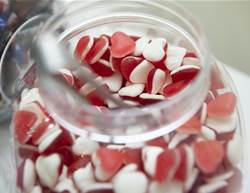- Loss of smell may be linked to an increased risk of heart failure, a new study says.
- Researchers found that participants with a poor sense of smell had around a 30% higher risk of developing heart failure than participants with a good sense of smell.
- Experts explain the findings and potential connection between smell and heart disease.
As people age, it is not uncommon to experience some loss of sense of smell. Research shows nearly one in four people experience olfactory impairment by their early 50s, and more than half do after 80. And during the pandemic, many people lost their sense of smell due to COVID. But even before COVID-19, scientists found that a loss of smell may help predict or even contribute to the development of heart failure.
A study published in the Journal of the American Heart Association investigated the role that a poor sense of smell may play in the health of ageing adults. Researchers analysed data from 2,537 people in the National Institute on Aging’s Health ABC Study starting in 1997 and 1998. When participants enrolled in the study, they were healthy adults, 70 to 79 years old, and lived in America.
Participants were followed from the time their sense of smell was tested at their three-year clinic visit in 1999 or 2000 for up to 12 years, or until they had a cardiovascular event or died. Sense of smell was tested by having people sniff and identify 12 items from a list. One point was given for each correct answer for a score of 0 to 12.
Researchers defined a “poor” sense of smell as scoring an eight or less, “moderate” sense of smell for those scoring nine to 10, and “good” for those scoring 11 to 12. Researchers were looking for a link between poor sense of smell and having a heart attack, stroke, angina, death caused by coronary heart disease or congestive heart failure. Participants were considered to have heart failure if they were hospitalised overnight for the condition.
People with a poor sense of smell had about a 30% higher risk of developing congestive heart failure than participants with a “good” sense of smell, the study found. Dr Honglei Chen, the study’s lead author and a professor in the department of epidemiology and biostatistics at the Michigan State University College of Human Medicine, said in a statement that it’s still unclear as to whether a poor sense of smell may be contributing to the development of heart failure or merely predicted it.
So, how can loss of smell impact your heart failure risk? Previous data suggests that poor sense of smell is associated with thickening of the arteries and artery plaques, suggesting that smell loss may be a marker of atherosclerosis, the gradual buildup of plaque in the arteries and the underlying cause of cardiovascular disease, says Dr Mariell Jessup, chief science and medical officer for the American Heart Association.
“Further, when our sense of smell isn’t as strong, we might be more likely to make poor food choices that exacerbate existing risk factors, instead of choosing healthy, nutrient-dense foods.” This could contribute to cardiovascular disease over time, she explains.
As a failing sense of smell is strongly associated with ageing, as is the syndrome of congestive heart failure (CHF), the most straightforward interpretation of these results is that some individuals age at a more rapid rate than others, says cardiologist Dr Richard Wright.
“Such people might lose their sense of smell and cardiac function at a more rapid rate than do others, and hence the observed correlation of these two clinical conditions may simply be due to differential rates of ageing—similar to the various ages at which grey hair appears,” he points out.
The bottom line
We know that as we age, our sense of smell might start to gradually decline, in part due to neurodegeneration, which is usually associated with diseases like dementia and Parkinson’s disease, says Dr Jessup.
“However, in this study of older adults, poor sense of smell was associated with heart failure, particularly among those who reported very good to excellent health at baseline. This asks... if loss of smell may be a marker of deteriorating health even before more traditional signs.” Still, these are very preliminary data, Dr Jessup remarks.
We are continuously looking for validated and reliable early markers of disease, says cardiologist Dr Jonathan Fialkow. “If we can find a simple test like an olfactory [sense of smell] test and determine if the individual may be at risk for heart failure in the future, we may be able to offer lifestyle interventions or medical treatments to prevent heart failure,” he says.
The study is intriguing, but we need much more research before we should create actions based on this study, Dr Fialkow notes. Specifically, “We need more studies and observations to determine how powerful olfactory impairment is compared to other risk factors for heart failure,” he adds.
This study was conducted pre-COVID, so a loss of smell today could be due to other reasons, such as contracting the coronavirus.
Let this study be a reminder to have regular health check-ups and to report all abnormalities, even smell loss, to your doctor, says Dr Jessup. “You should always talk to your doctor if you experience sudden changes in your health. If you suddenly notice that your favourite scents aren’t as strong, or if you can’t smell at all, be sure to make an appointment to speak with your healthcare team and keep track of when any changes occurred and if you noticed any other symptoms as well,” she advises.










